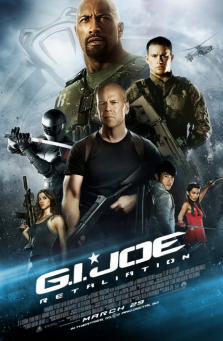By Michael Scoular (The Cascade) – Email
Print Edition: April 3, 2013
 There might not be a stronger case of corporate synergy going than the successful partnership of Hasbro and the United States military. It doesn’t take a lot of imagination to turn the real estate grabbing and search and destroy objectives of popular board games into something cynical, but the metal and war cum recruitment advertising appeal of the Transformers, Battleship and G.I. Joe “adaptations” have made this the only way to associate the two – they are inextricably, enduringly linked. The only possible—possibly unintentional—counter to this is that, more than the overlong attempted humour of a nuclear summit, the most successful joke in G.I. Joe Retaliation is the repeated image of military orders to destroy the entire planet dutifully carried out by straight-faced uniformed faces. The “talent” associated with anything this large and pre-directed might as well be incidental, and it is into this framework Jon M. Chu enters.
There might not be a stronger case of corporate synergy going than the successful partnership of Hasbro and the United States military. It doesn’t take a lot of imagination to turn the real estate grabbing and search and destroy objectives of popular board games into something cynical, but the metal and war cum recruitment advertising appeal of the Transformers, Battleship and G.I. Joe “adaptations” have made this the only way to associate the two – they are inextricably, enduringly linked. The only possible—possibly unintentional—counter to this is that, more than the overlong attempted humour of a nuclear summit, the most successful joke in G.I. Joe Retaliation is the repeated image of military orders to destroy the entire planet dutifully carried out by straight-faced uniformed faces. The “talent” associated with anything this large and pre-directed might as well be incidental, and it is into this framework Jon M. Chu enters.
In the slightly odd, nearly unique situation of a continuing franchise not given an exceptional budget, high expectation or marquee cast, Jon M. Chu made the two best Step Up movies, with Step Up 3 maybe the best musical made in the modern studio era. The clear definition of movement, crossing of spaces, compression and contortion of bodies Chu was able to deliver might suggest action cinema a translatable genre jump, but there is too much ground already set to be covered by the demands of studio-genre homogeneity.
The more summer entertainment exposure, the more likely the definite patterns of forgettable “fun” rise to the surface. Anticipating fast forward, movies like G.I. Joe: Retaliation divide crammed together gun and fist action with dialogue thought to develop quirks, introduce themes to be brought up in climactic confrontations, or “reveal character.” Characters must always be pre-demonstrably good – though we’re never spared attempts at demonstration. They’re good with kids or leadership or some other way of standing up for their own goodness. Early scenes with Channing Tatum and Dwayne Johnson recall the way housebound Step Up scenes always lied between exaggerated get-through-it convention and awkwardly earnest drama, less successful is Adrianne Palicki’s single speech to herself, lacking both the jokey passion of and absence of leering at Step Up 2’s Briana Evigan.
Compared to the first G.I. Joe, Chu might be said to have added a degree of physicality – in an initial raid to recover vital materials (the G.I. Joe series is single-mindedly nuclear), action is arrived at through climbing, leaping, and absent the CG that choked every frame of the original. But this is only the finer details – everything is integrated in a mediocrity of barely-discernable violent whatever that doesn’t suggest a clearer look would lead to anything better. The attitude toward action in necessarily large studio productions is the barest minimum of discretion in editing to achieve the kind of gun and fire showoff that only fulfills expectation. (Flash, noise, sounds of death and defeat.) To create greater expectation by providing a hint at more, at difference; to be in any way imaginative in the first place would be to create the possibility for disappointment. G.I. Joe: Retaliation can be said to be better than the first in the series – this means basically nothing to someone looking for a work of craft or excitement or joy, and all that is needed to a studio or to those relying on the repetitions of formula of last summer or last week. Like any formula, the reused conclusion of crosscut teamwork (always in some way incomprehensible, but cut quick enough to make noticing pointless), climactic destruction, and final confrontation, does not suggest anything of quality by its use alone, but is so interchangeably worked, ossified into recognition, that it in a way is intelligent design – everything bleeds together, becomes forgettable, allows for historical copy to appear new again.
Suggesting that perhaps, with the right conditions, Chu could make something great in the future, there are two unexpected, improbably sustained moments that show more than competence. Introing what turns out to be video game competition, the screen is left black, conditioning us to the pounding of violent sounds only to reveal it as a joke – there’s nothing beyond this because the entire production lives on the idea of the necessity of this, but it holds more than the tired guitar rock of the actual action scenes. And for 10 wordless minutes of snow and wood-constructed clarity, a fleet, acrobatic echo of Step Up contact that surpasses anything else before or after in the movie appears, showing there is some kind of ability even in a first production of this kind. But it is, as a whole, swallowed by the interest that says all entertainment must do is bombard us, the only way government could go wrong is through nefarious imposter plot, and all that matters in the end is that there’s enough earth left for the next installment.


